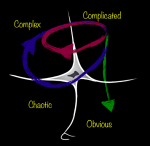 We know that current development challenges are complex. But not all elements of a development programme are necessarily complex. How does a theory of change look like that shows us which aspects of a programme are complex and which aren’t? How does this help managers to develop appropriate strategies for interventions and focus their attention?
We know that current development challenges are complex. But not all elements of a development programme are necessarily complex. How does a theory of change look like that shows us which aspects of a programme are complex and which aren’t? How does this help managers to develop appropriate strategies for interventions and focus their attention?
I have been thinking quite a bit about monitoring and how to find a monitoring framework that works in programmes that are facing the complexities of the real world (and I blogged about it before here and here). More and more monitoring guides speak about the complexities programme managers and staff face ‘out there’ and some guides even venture as far as to say that change in the real world is not linear or predictable. The new BEAM Monitoring guidance, which I co-authored, for example, states that ‘a market systems programme is unlikely to achieve its goals in a simple, linear way. It may be difficult to fully understand (at least in advance) how causes and effects will work at a system-wide level. There may therefore be significant uncertainties about how the overall market system may be re-oriented to serve poor people better.’ Continue reading




 Also this year I will be training at the Mesopartner Summer Academy, which takes place in Berlin from July 7 to 11.
Also this year I will be training at the Mesopartner Summer Academy, which takes place in Berlin from July 7 to 11.